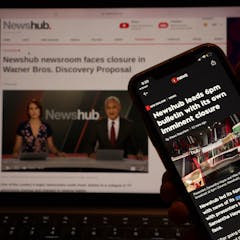
Articles on Meta
Displaying 1 - 20 of 116 articles

Meta, the parent company of Facebook, has already switched news off in Canada. Australia could easily be next – here’s what that might lead to.

Science fiction and technological innovation feed off each other in an ongoing back-and-forth that can play out over decades.

A new report has found that 15 per cent of English-speaking Canadians are paying for news in 2024, compared to 11 per cent in 2023. But it is too early to rejoice.

In a statement on Wednesday the commissioner, Julie Inman Grant, said she had decided to discontinue the federal court proceedings and instead welcomed the opportunity for an independent review.

Social media platforms need to open up data to Africans and researchers in the global south.

The global trade in data means minor drug dealing by 16-year-olds on social media could hurt their ability to get a job, house or insurance in their 30s.

People participate in online communities to share experiences and sympathy. AI chatbots that join the conversation can only pretend to offer either.

A new parliamentary committee will look into how social media operates in Australia, including how children access it. Regulating the industry won’t be easy.

The upgraded AI systems may even be able to undertake a form of reasoning.

As wildfire season approaches, Canadians —especially northerners and Indigenous Peoples — are being let down by Meta and their government when they need them most.

In the court of public opinion, Anthony Albanese’s rejection of the up-yours attitude of the man he labels an arrogant egotistical billionaire is Likely to resonate with many Australians.

Unlike the risks from AI’s capabilities, the economic risks from new technologies are knowable and can be mitigated

Four Ontario school boards have filed a lawsuit against social media platforms to force them to change practices that harm schoolchildren.

A new change to Meta’s apps will see users no longer recommended political content by default. The ramifications of this will be far-reaching.

New research shows that even after Facebook made changes to stem the tide of dangerous pandemic misinformation, some accounts continued to thrive.

Online extremism is a unique challenge – terrorists use methods that can’t be captured by standard content moderation. So, what can we do about it?

Fibre optic cables now literally encircle Africa, though some parts of the continent are far better connected than others.

Australia needs to prioritise finding new funding to support journalism, particularly in remote and regional areas.

Calls for the Fair News Digital Bargaining Bill to be fast-tracked are misguided. A better solution would be a straight levy on digital advertising to fund public interest news production.

Meta is getting out of the news business to avoid paying for journalism under the Australian Government’s News Media Bargaining Code - but no one is surprised.
